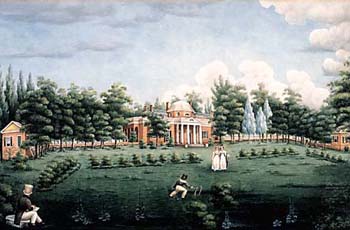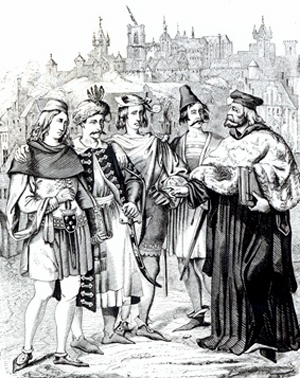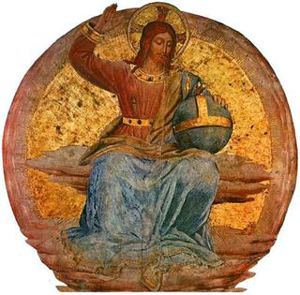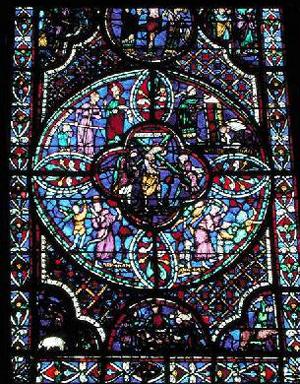 |
Organic Society
Two Opposed Poles of Society:
Prestige and Money
Plinio Corrêa de Oliveira
If the South in the United States would not have been practically destroyed after the Civil War, if those organic Southern traditions had continued, they could have developed into strong and good regional characteristics.

The culture of the Antebellum South favored values over wealth |
Why? Because the Antebellum South was a society based more on the value of prestige than money. Persons of society had also a certain amount of money, but their prestige did not come from their money. Their wealth was a complementary element to support their prestige.
This is something like the magnificence of the Vatican. The prestige of the Pope does not come from the magnificence of the Vatican. It comes from the spiritual mission of the Pope. However, it is convenient for the exercise of his mission to have a certain magnificence; it frames his mission with prestige and makes it easier for him to exert his duty.
Now, if a country like the United States would have had elites, if the revolutionary mentality had not raised egalitarianism to the highest pedestal, if money had not acquired the central role in the American mentality, if the country had not experienced such an eclectic importation of people from all over the world, then the United States could have had a more organic foundation and society than it did.
Antagonism between prestige and money
Such problems are very easy to describe, but what are the solutions?
I believe that these problems and their solutions can be presented as an antagonism between the supremacy of prestige and money. In face of these different mentalities, there are two kinds of societies: one gives priority to prestige; another gives precedence to money.

Students from different nations respectfully greet the Rector of the University of Prague |
Prestige is a moral value that counts on recognition by a certain society of the good done by a person, family, class or sector of society. Let us take, as illustration of this point, a body of professors in a university. In cities like Louvain, Paris, Bologna or Heidelberg, the professor used to enjoy enormous prestige. These cities had universities that were famous worldwide and attracted students from its four corners.
The professors had special apparel to distinguish them. The people of the city esteemed them because they admired the value of intelligence and culture. When a professor would deliver an especially brilliant class, the students would follow him through the city until he reached his house, cheering him and paying him homage. At times, they would throw their capes on the ground for the professor to step on as if they were carpets. The professor had the title of Master and was respected by the entire city.
Let us suppose that in that same city there were some very rich bankers. Should the people admire the bankers more than the professors?
When a society has strong principles, noble ideals and high moral values, prestige takes precedence over money. It moves more people to admiration than money does. When moral decadence sets in, money becomes more valuable than prestige. Then, the one who has money and can do practical things becomes more important than the one who has knowledge, respectability and honors. The patterns break and change. For all practical purposes the economically powerful man looks like the one who can do everything while the man of prestige can do very little.
In a society with a strong structure of moral values, the noble class normally has much more authority and power of decision over public affairs than the financial class. But if the society is weak in its convictions, without ideals and turned toward practical things, then money and its correlated propaganda are valued more than prestige. When this happens, everything goes downhill.
I believe that either men will have a high moral standard inspired by a good clergy – the salt of earth and light of the world - and prestige will reign or, should this be lacking, money will reign. In the latter case organic society has started to die.
Only prestige based on virtue can restore our revolutionary society
To restore a society like the one in which we live, which abandoned the moral standards of Our Lord Jesus Christ, the consensus of the whole world is needed. To use a modern phrase I don’t like but that expresses a part of reality, the world has become a village. Everyone knows what is happening everywhere. So, either everyone turns resolutely toward a different position as an ensemble or nothing will go forward.

A society with all things restored in Christ |
At this point someone could object: The idea that men worldwide could achieve a high level of morality to build another society is simply not feasible. Therefore, you are presenting something impossible as an ideal.
I would answer: Yes, naturally speaking, it would be very difficult, perhaps even impossible. But, we are working with the possibility of a great chastisement that will come, as predicted in Fatima, to restore mankind to the right path. So, at a certain moment, a great natural-supernatural crisis will occur and will cause mankind to reconsider the present day standards it chose. We should be ready to send our message when this moment comes.
Since we are studying how organic society of the past was built and how to re-build another in the future, it seems to me that this action of the ensemble should be considered. Otherwise, when society will be restored, we will not know how to keep it on the right path and do all we can to prevent a new decadence.
Customs and technology
Supposing, then, that the ensemble of a restored society experiences a material progress along with its social consequences, how should it be properly oriented? The influence of the Church in the Middle Ages shows us that when a collective psychology is formed in accordance with the four cardinal virtues (justice, prudence, fortitude and temperance), then concrete problems are not resolved by technocrats, but by the organic customs.

13th century window in St. Etienne Cathedral in Bourges |
For instance, let us consider the artisanship of stain glass windows. When medieval society had progressed to the point that men were building their cathedrals, the artisans started to study the best way to color glass and place them in the cathedral arches. These were concrete problems faced by artisans of that particular craft.
They resolved the problem not by forming a commission of technicians, but through practice, by trial and error: Small successes here, partial solutions there, some failures there. During all this time, the natural exchange of experiences and opinions shaped a practice that became a custom that, in its turn, led to the brilliant results of the medieval stain glass windows. To this day they raise admiration in anyone with a drop of culture. The solutions that come from customs are much richer and full of life than those obtained by committees and technicians.
Technique, I believe, is much less intelligent and agile than custom for resolving problems. For the custom, however, to give the good results it gave with the stain glass windows, it must be practiced by virtuous people, by persons who have as their ideal the glory of God.
With this we can understand the principle that moral ideals and virtue must govern society, not technique and money.

Posted December 11, 2008

  | | Prof. Plinio |
Organic Society was a theme dear to the late Prof. Plinio Corrêa de Oliveira. He addressed this topic on countless occasions during his life - at times in lectures for the formation of his disciples, at times in meetings with friends who gathered to study the social aspects and history of Christendom, at times just in passing.
Atila S. Guimarães selected excerpts of these lectures and conversations from the trancripts of tapes and his own personal notes. He translated and adapted them into articles for the TIA website. In these texts fidelity to the original ideas and words is kept as much as possible.

Related Topics of Interest
 The Role of Economy in the Collapse of the Medieval Mentality The Role of Economy in the Collapse of the Medieval Mentality
 The Decay of the Medieval Guilds The Decay of the Medieval Guilds
 Proportion Between the City and the Man Proportion Between the City and the Man
 Critique of Capitalism from an Organic Perspective - Part I Critique of Capitalism from an Organic Perspective - Part I
 The Harmful Mentality of Borrowing Money - Part II The Harmful Mentality of Borrowing Money - Part II
 Vocations of the European Peoples Vocations of the European Peoples
 Revolution and Counter-Revolution in the Tendencies, Ideas, and Facts Revolution and Counter-Revolution in the Tendencies, Ideas, and Facts

|
Organic Society | Social-Political | Home | Books | CDs | Search | Contact Us | Donate

© 2002-
Tradition in Action, Inc. All Rights Reserved
|
 |
|